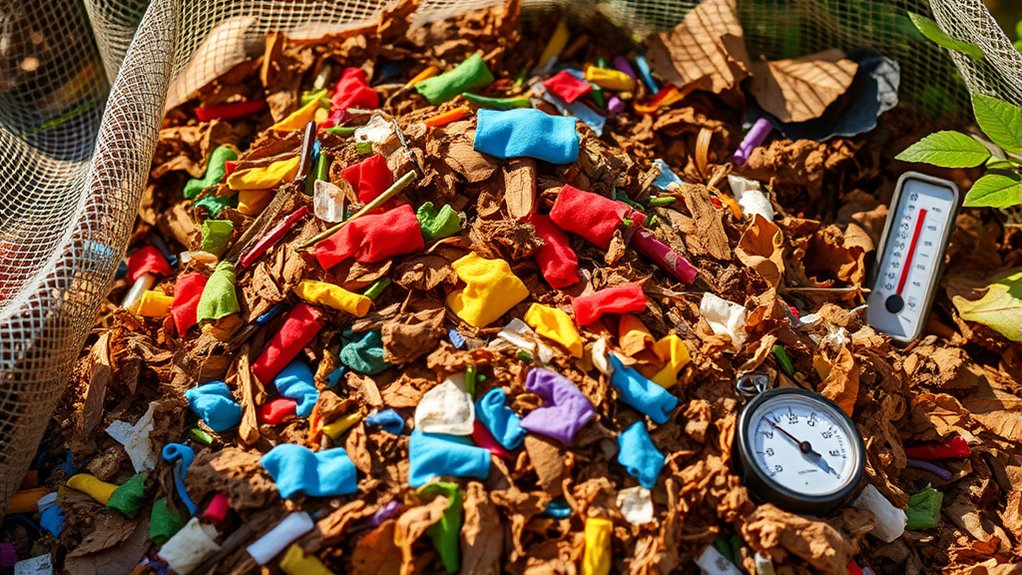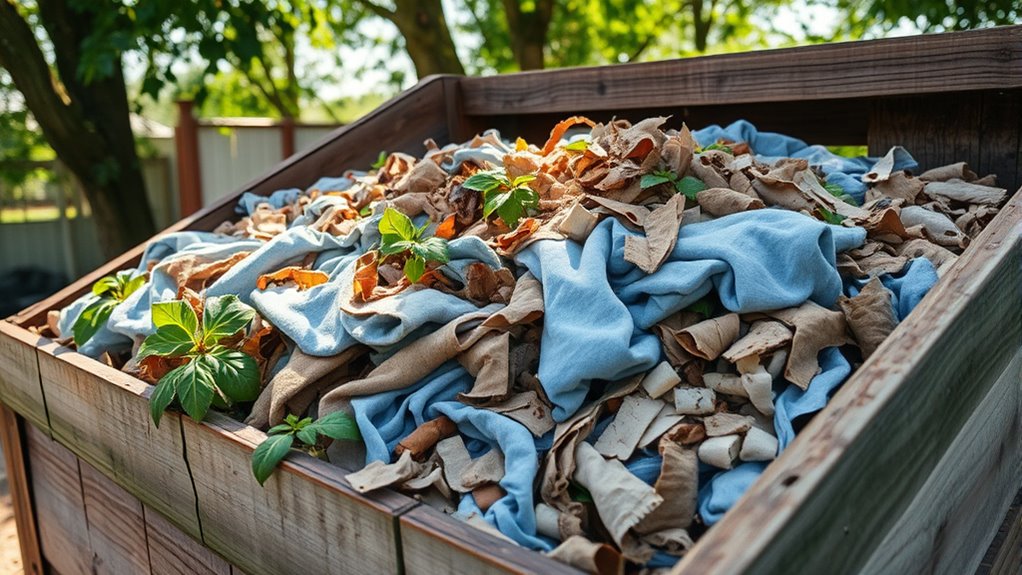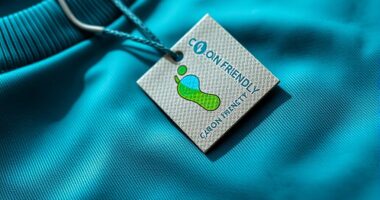Yes, you can compost old T-shirts made from natural fibers like cotton, linen, or hemp. Tear them into small strips to speed up decomposition and mix them with other organic waste like vegetable scraps and leaves. Avoid synthetic fabrics or dyes, which don’t break down and may release toxins. Keep the compost moist and aerated for best results. Keep going, and you’ll discover how to turn your old T-shirts into rich, healthy soil.
Key Takeaways
- Only compost natural fiber T-shirts like cotton, linen, or hemp; avoid synthetic fabrics and dyes.
- Tear T-shirts into small strips to increase surface area and accelerate microbial breakdown.
- Incorporate fabric pieces gradually into compost with organic waste, maintaining proper moisture and aeration.
- Wash T-shirts beforehand to remove chemicals and residues that could hinder microbial activity.
- When properly composted, natural fibers turn into nutrient-rich soil, reducing waste and supporting sustainable gardening.

Old T-shirts often end up in the trash, but they can be a valuable addition to your compost pile. While it might seem unconventional, composting old T-shirts is entirely possible if you understand how fabric degradation works and how to approach eco-friendly disposal. The key is recognizing that cotton and other natural fibers in T-shirts break down over time, turning into nutrient-rich compost that benefits your garden. Synthetic fabrics, however, pose challenges because they don’t decompose easily and can release harmful substances. So, before composting, make sure your T-shirt is made of natural fibers like cotton, linen, or hemp.
Natural fiber T-shirts like cotton and linen are compostable and eco-friendly options.
To start, examine your T-shirt carefully. If it’s predominantly made of natural fibers, tear it into smaller strips. Smaller pieces decompose faster because they increase the surface area exposed to microbes. Mixing these fabric pieces into your compost bin or pile ensures better contact with the composting environment, accelerating the process. Remember, fabric degradation occurs through microbial activity—bacteria and fungi slowly break down the cellulose in natural fibers, converting it into organic matter that enriches your soil. Proper composting conditions are essential to facilitate the breakdown process effectively.
In terms of eco-friendly disposal, composting your old T-shirts reduces waste sent to landfills, lowering methane emissions that arise from fabric decomposition in anaerobic conditions. It’s a sustainable way to repurpose materials instead of sending them to the trash. Just be cautious not to include T-shirts with synthetic dyes, polyester, or other synthetic materials, as they won’t decompose and may introduce toxins into your compost. To maximize eco-friendly disposal, wash the T-shirts beforehand to remove any chemicals or residues that could interfere with composting microbes.
You can add T-shirt fabric gradually to your compost pile, mixing it well with other organic waste like vegetable scraps, grass clippings, and shredded leaves. This helps maintain a balanced carbon-to-nitrogen ratio, which is essential for effective composting. Keep the compost moist and aerate it regularly to facilitate microbial activity and fabric degradation. Over time, the fibers will soften and break down, turning into dark, crumbly compost that’s ready to enhance your garden soil.
Frequently Asked Questions
Can Synthetic T-Shirts Be Composted Safely?
You can’t safely compost synthetic T-shirts because synthetic fibers, like polyester, are plastics that contribute to plastic pollution. When you try to compost them, they don’t break down naturally and may release harmful microplastics into the environment. Instead, consider repurposing or recycling your synthetic T-shirts. This way, you reduce waste and help prevent the ongoing issue of plastic pollution caused by synthetic fibers.
How Long Does It Take for a T-Shirt to Decompose?
Think of a T-shirt as a slow-burning candle, gradually fading into the earth. Typically, it takes about 2 to 5 years for a T-shirt to decompose in a compost bin setup, depending on fabric type and conditions. Synthetic fibers linger longer, but natural textiles like cotton break down faster. To accelerate textile recycling, guarantee your compost bin is well-maintained, turning regularly to help your old T-shirts return to the soil.
Are There Any Risks of Mold or Pests?
You might worry about mold or pests when composting old T-shirts, but proper preparation minimizes these risks. Using pest deterrents and ensuring good airflow helps prevent fabric deterioration caused by mold or insects. Keep the T-shirts buried enough in the compost, and avoid adding overly wet or dirty cloths. This approach promotes safe decomposition and keeps pests away, making your composting process smoother and more successful.
What Amendments Improve T-Shirt Composting?
To improve your t-shirt composting, add amendments like shredded leaves, straw, or paper to boost airflow and balance moisture. Natural fibers from old T-shirts break down more efficiently when mixed with these carbon-rich materials, aiding waste reduction. These amendments help prevent mold and pests by creating a healthy, aerobic environment. Keep your compost well-aerated and moist, and you’ll turn old T-shirts into nutrient-rich compost with ease.
Can Colored or Printed T-Shirts Be Composted?
You can compost colored or printed T-shirts, but you should proceed with caution. Fabric dyes and printing inks may contain chemicals that aren’t ideal for compost. If the dyes are natural and the printing inks are non-toxic, your T-shirts are more compost-friendly. Remove any synthetic or heavily dyed sections, and cut the shirts into small pieces to help them break down faster. When in doubt, research the dyes and inks used on your shirts.
Conclusion
So, next time you’re ready to toss that old t-shirt, remember you can turn it into nutrient-rich compost instead of waste. Think of it as giving your shirt a second life—kind of like a phoenix rising from the ashes. Composting your old t-shirts isn’t just good for the planet; it’s a small act of magic that transforms trash into treasure. Why not give it a try and watch your garden thrive?










